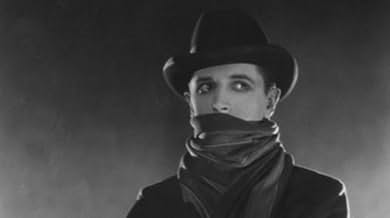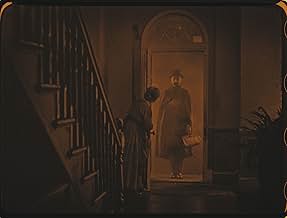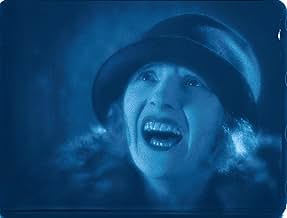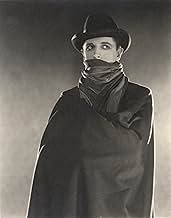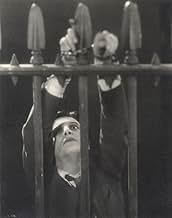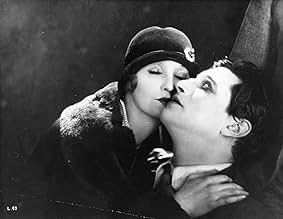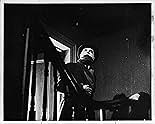CALIFICACIÓN DE IMDb
7.3/10
14 k
TU CALIFICACIÓN
Una propietaria sospecha que su nuevo inquilino es el loco que mata a las mujeres en Londres.Una propietaria sospecha que su nuevo inquilino es el loco que mata a las mujeres en Londres.Una propietaria sospecha que su nuevo inquilino es el loco que mata a las mujeres en Londres.
- Dirección
- Guionistas
- Elenco
June Tripp
- Daisy - A Mannequin
- (as June)
Wallace Bosco
- Pub Customer
- (sin créditos)
Daisy Campbell
- Mother
- (sin créditos)
Maudie Dunham
- First Victim
- (sin créditos)
Reginald Gardiner
- Dancer at Ball
- (sin créditos)
Eve Gray
- Showgirl Victim
- (sin créditos)
Alfred Hitchcock
- Extra in Newspaper Office
- (sin créditos)
Alma Reville
- Woman Listening to Wireless
- (sin créditos)
Opiniones destacadas
it is a real special film. first - for the status of early Hitchcock. the second - for Ivor Novello performance who seems be more than a good one but the right piece for the balance of film. the story is predictable and this fact did it charming. because old themes are mixed with smart images. because the romanticism and the touching scenes reminds the popular literature of XIX century. because it is fresh and naive and seductive and dark. and because it is a fascinating clue for discover the art of its director in new and interesting perspective.
The Lodger was the feature which Hitchcock himself described as his first true film (it was actually his third complete one), and film historians, particularly auteurists tend to focus upon it because it is it introduces themes of murder and suspense that Hitch's name would later be synonymous with.
To be honest, the first thing that strikes me upon watching The Lodger is its sense of rhythm. Hitchcock's earliest films were always very rhythmic and the opening moments of The Lodger are a great example, with a dynamic and attention grabbing sequence of shots and title cards. Much of this however may be down to the style of the seldom referenced screenwriter Eliot Stannard, who has a credit on all but one of Hitchcock's silents. Stannard was a master at telling stories in purely visual terms, and his screenplays often go as far as to map out series of interlocking images.
The next very obvious thing about The Lodger is that right from the start Hitchcock was more interested in cinematic technique than he was in performances or artistry. The Lodger is crammed with Expressionist effects, in particular double exposures. Hitch clearly hadn't learnt the art of subtlety yet and these are massively overused. We can also tell early on that Hitchcock was interested in using his camera to involve the audience in the film, throwing in point-of-view shots or drawing our attention to specific items. In this regard his technique was not yet refined. He was develop it in his later silents.
Of course what generally interests followers of Hitchcock's career is the fact that The Lodger is the first time he deals with the grisly subject of murder. It's true that there are many Hitchcockian elements here murder, blondes, a love triangle and even a MacGuffin in the form of the Avenger whom all the characters are concerned about but isn't the focus of the story. There is a kind of morbid sensationalism concerning the killings, something we'd see right through to the other end of Hitch's career with the comment about "ripped whores" in 1972's Frenzy. There's also of course a "wrong man", although here he appears more as the subject of a whodunit. The later Hitchcock would have focused upon the plight of the wrongly accused, and made a more suspenseful film in the process.
All in all, The Lodger isn't really as significant an early Hitchcock as some would believe. For one thing there is the influence of screenwriter Stannard and the fact that Hitchcock, although he may have relished the material, was still very young and inexperienced. The fact is The Lodger may contain more of Stannard's influence than it does Hitchcock's. It's not as if Hitchcock immediately began making more murder thrillers. The majority of his British thrillers are of the espionage/adventure variety, and it would take up until the early 40s for Hitchcock to really begin making masterpieces in the domestic murder genre. It's also nowhere near being Hitch's best silent film, even though it tends to be remembered over more polished works like The Ring and The Manxman. Taken out of context though, it is a fairly decent late silent thriller, with only a few minor flaws in plot and direction.
To be honest, the first thing that strikes me upon watching The Lodger is its sense of rhythm. Hitchcock's earliest films were always very rhythmic and the opening moments of The Lodger are a great example, with a dynamic and attention grabbing sequence of shots and title cards. Much of this however may be down to the style of the seldom referenced screenwriter Eliot Stannard, who has a credit on all but one of Hitchcock's silents. Stannard was a master at telling stories in purely visual terms, and his screenplays often go as far as to map out series of interlocking images.
The next very obvious thing about The Lodger is that right from the start Hitchcock was more interested in cinematic technique than he was in performances or artistry. The Lodger is crammed with Expressionist effects, in particular double exposures. Hitch clearly hadn't learnt the art of subtlety yet and these are massively overused. We can also tell early on that Hitchcock was interested in using his camera to involve the audience in the film, throwing in point-of-view shots or drawing our attention to specific items. In this regard his technique was not yet refined. He was develop it in his later silents.
Of course what generally interests followers of Hitchcock's career is the fact that The Lodger is the first time he deals with the grisly subject of murder. It's true that there are many Hitchcockian elements here murder, blondes, a love triangle and even a MacGuffin in the form of the Avenger whom all the characters are concerned about but isn't the focus of the story. There is a kind of morbid sensationalism concerning the killings, something we'd see right through to the other end of Hitch's career with the comment about "ripped whores" in 1972's Frenzy. There's also of course a "wrong man", although here he appears more as the subject of a whodunit. The later Hitchcock would have focused upon the plight of the wrongly accused, and made a more suspenseful film in the process.
All in all, The Lodger isn't really as significant an early Hitchcock as some would believe. For one thing there is the influence of screenwriter Stannard and the fact that Hitchcock, although he may have relished the material, was still very young and inexperienced. The fact is The Lodger may contain more of Stannard's influence than it does Hitchcock's. It's not as if Hitchcock immediately began making more murder thrillers. The majority of his British thrillers are of the espionage/adventure variety, and it would take up until the early 40s for Hitchcock to really begin making masterpieces in the domestic murder genre. It's also nowhere near being Hitch's best silent film, even though it tends to be remembered over more polished works like The Ring and The Manxman. Taken out of context though, it is a fairly decent late silent thriller, with only a few minor flaws in plot and direction.
A stranger (Ivor Novello) in fog-bound London seeks accommodation from a family and they provide him with a small apartment upstairs. Their blond daughter is drawn towards this fascinating and somewhat mysterious gentleman. Her parents become suspicious of the intentions of the lodger and they live in fear of her safety. There is a serial killer abroad in the foggy streets and who knows? this stranger could be that maniac.
It is interesting to view an early Hitchcock film as far back as the silent era. I am surprised at the quality (despite a few scratches here and there). The addition of music is rather overdone in my opinion but it does fill in the empty silence and does add a dramatic effect. No doubt in the early days a capable pianist (below the screen) bashed out some impromptu music to fit the mood of each scene.
It is an uncomplicated story but that does not mean the guilty person is easily recognized (if at all!) Hitchcock likes to tease with a lodger who has shifty eyes, who paces the floor (what an original idea to photograph through a transparent floor), who has the wall pictures removed and who creeps out silently at night.
I feel that the atmosphere created is exceptional. Certainly a bit theatrical with exaggerated eye expressions but compelling nevertheless.
When you see a film of this vintage you realise how much film production had already advanced in the 20's and without the aid of all our recent technological contrivances.
It is interesting to view an early Hitchcock film as far back as the silent era. I am surprised at the quality (despite a few scratches here and there). The addition of music is rather overdone in my opinion but it does fill in the empty silence and does add a dramatic effect. No doubt in the early days a capable pianist (below the screen) bashed out some impromptu music to fit the mood of each scene.
It is an uncomplicated story but that does not mean the guilty person is easily recognized (if at all!) Hitchcock likes to tease with a lodger who has shifty eyes, who paces the floor (what an original idea to photograph through a transparent floor), who has the wall pictures removed and who creeps out silently at night.
I feel that the atmosphere created is exceptional. Certainly a bit theatrical with exaggerated eye expressions but compelling nevertheless.
When you see a film of this vintage you realise how much film production had already advanced in the 20's and without the aid of all our recent technological contrivances.
The Lodger (1927)
This is the first of three movies in a 30 year period based on the same plot, and in terms of plot this is the best of them. (There is also a recent one that is the worst of the bunch.) It is, for sure, an early Alfred Hitchcock film. It's early in the sense that it's still creaky at times. It's Hitchcock because it's tightly made, visually dramatic, and it combines sympathy and suspense really well.
If you are into what makes Hitchcock tick, you really have to see this movie. Not that you should mind--it's great stuff. First of all you get the presumably innocent man accused of a string of murders (this is ambiguous). Then you have the mixing of sex and murder (or lust and murder--there is no sex here). And then you have the way Hitchcock mixes every day regular people and very safe and homey situations with genuine terrible murderous events. And finally there is his filming and editing.
Take a look even at the very first shot--a close up a screaming woman shot at an angle (a "Dutch angle"). Look next at how dark and impressionistic the next shots are of a horrified crowd, a cop, and a reporter. Later there are other interesting cuts to lead you to thinking a certain way about the characters. And the overlapping of images. And the shot of a man walking overhead on glass, as if you can see through the ceiling.
The humor and clever conversation of later versions of this story are naturally lost on us here. Also in good Hitch fashion there are few intertitle cards. Good thing. The visuals tell the story. And wait until the final scenes, the Pieta all over again, really gorgeous. Some of these last shots were redone at the request of the studio to change the impressions of the main character, a handsome man with an acting reputation to protect. Hitchcock went along, and it seems to be acceptable all around by the time it was released.
It's hard to find a decent "print" of this (a version from a good copy of the film, on DVD or streaming), but it has recently been restored and re-scored (orchestrated) and that's for sure the one to get. It is so far only a U.K. release, apparently even a blu-ray version is out (look for the red and black Constructivist cover). Criterion has not released a version. The original release has different scenes tinted blue or amber for greater effect and the usual version on Hitchcock DVDs and DVD sets in the U.S. is all black and white.
So, if you don't like silent films and can't stand choppy or grainy or badly cropped releases of early films, don't see this. But if you can find the clean new restoration, or you just love Hitchcock, or if you really like silent films (they get more and more amazing the more you see), then see this! It's the director's first really characteristic feature.
This is the first of three movies in a 30 year period based on the same plot, and in terms of plot this is the best of them. (There is also a recent one that is the worst of the bunch.) It is, for sure, an early Alfred Hitchcock film. It's early in the sense that it's still creaky at times. It's Hitchcock because it's tightly made, visually dramatic, and it combines sympathy and suspense really well.
If you are into what makes Hitchcock tick, you really have to see this movie. Not that you should mind--it's great stuff. First of all you get the presumably innocent man accused of a string of murders (this is ambiguous). Then you have the mixing of sex and murder (or lust and murder--there is no sex here). And then you have the way Hitchcock mixes every day regular people and very safe and homey situations with genuine terrible murderous events. And finally there is his filming and editing.
Take a look even at the very first shot--a close up a screaming woman shot at an angle (a "Dutch angle"). Look next at how dark and impressionistic the next shots are of a horrified crowd, a cop, and a reporter. Later there are other interesting cuts to lead you to thinking a certain way about the characters. And the overlapping of images. And the shot of a man walking overhead on glass, as if you can see through the ceiling.
The humor and clever conversation of later versions of this story are naturally lost on us here. Also in good Hitch fashion there are few intertitle cards. Good thing. The visuals tell the story. And wait until the final scenes, the Pieta all over again, really gorgeous. Some of these last shots were redone at the request of the studio to change the impressions of the main character, a handsome man with an acting reputation to protect. Hitchcock went along, and it seems to be acceptable all around by the time it was released.
It's hard to find a decent "print" of this (a version from a good copy of the film, on DVD or streaming), but it has recently been restored and re-scored (orchestrated) and that's for sure the one to get. It is so far only a U.K. release, apparently even a blu-ray version is out (look for the red and black Constructivist cover). Criterion has not released a version. The original release has different scenes tinted blue or amber for greater effect and the usual version on Hitchcock DVDs and DVD sets in the U.S. is all black and white.
So, if you don't like silent films and can't stand choppy or grainy or badly cropped releases of early films, don't see this. But if you can find the clean new restoration, or you just love Hitchcock, or if you really like silent films (they get more and more amazing the more you see), then see this! It's the director's first really characteristic feature.
This movie is fantastic and fascinating mostly because of its director, but it would be fun either way. I'd say that it's better than many films of the same period, but not to the same extreme degree that Hitchcock's movies eventually achieved.
You can see it's his work, though. Hitchcock knew that what made a suspenseful movie good had nothing to do with gore or loud noises, and this shows even in his early work. The Lodger has a distinctly Hitchcock feel to it--fun and scary--and it's interesting to see how he gets around the lack of sound, considering the fact that most (all?) of his other films were talkies.
You can see it's his work, though. Hitchcock knew that what made a suspenseful movie good had nothing to do with gore or loud noises, and this shows even in his early work. The Lodger has a distinctly Hitchcock feel to it--fun and scary--and it's interesting to see how he gets around the lack of sound, considering the fact that most (all?) of his other films were talkies.
¿Sabías que…?
- TriviaFor the opening of this movie, Sir Alfred Hitchcock wanted to show the Avenger's murder victim being dragged out of the Thames River at night with the Charing Cross Bridge in the background, but Scotland Yard refused his request to film at the bridge. Hitchcock repeated his request several times, until Scotland Yard notified him that they would "look the other way" if he could do the filming in one night. Hitchcock quickly sent his cameras and actors out to Charing Cross Bridge to film the scene, but when the rushes came back from the developers, the scene at the bridge was nowhere to be found. Hitchcock and his assistants searched through the prints, but could not find it. Finally, Hitchcock discovered that his cameraman had forgotten to put the lens on the camera before filming the night scene.
- ErroresWhen The Lodger (Ivor Novello) and Daisy (June Tripp) are playing chess, but the board is set up inappropriately. The square in the right corner should always be white. In this case, the bottom-right square is dark (black). This is the most obvious when The Lodger (Ivor Novello) is poking the coals in the fireplace.
- Citas
Joe Betts: Does this lodger of yours mean any harm to Daisy?
The Landlady: Don't be silly, Joe. He's not that sort. Even if he's a bit queer, he's a gentleman.
- Créditos curiososClosing credits: Thank you to everyone who supported the BFI's Silent Hitchcock restoration project.
- Versiones alternativasThe original version of The Lodger directed by Alfred Hitchcock in 1926 was restored in 1999 in honor of the directors 100th anniversary. The film was restored by the British National Film & TV Archives and a new score by Ashley Irwin was commissioned by ZDF/ARTE (Germany) and premiered on August 13, 1999 (what would have been Hitchcock's 100th birthday).
- ConexionesEdited into Histoire(s) du cinéma: Une vague nouvelle (1999)
Selecciones populares
Inicia sesión para calificar y agrega a la lista de videos para obtener recomendaciones personalizadas
Detalles
- Fecha de lanzamiento
- País de origen
- Idioma
- También se conoce como
- The Lodger
- Locaciones de filmación
- Productoras
- Ver más créditos de la compañía en IMDbPro
Taquilla
- Presupuesto
- GBP 12,000 (estimado)
- Total a nivel mundial
- USD 83,568
- Tiempo de ejecución1 hora 32 minutos
- Color
- Mezcla de sonido
- Relación de aspecto
- 1.33 : 1
Contribuir a esta página
Sugiere una edición o agrega el contenido que falta


